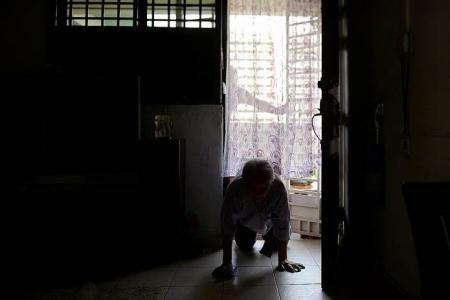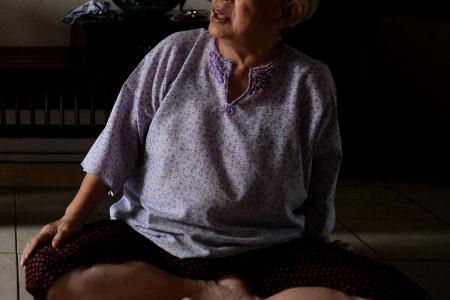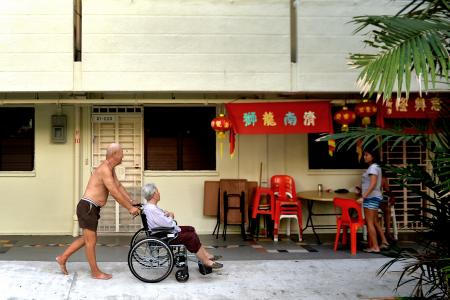She has to crawl around after losing use of legs, but says she doesn't need social services to step in
She can no longer walk, so she resorts to crawling around her home.
"The last time I could walk was three years ago. I got a minor stroke. Doctors said I have problems with my joints," Madam Kalsom Abdullah says sadly.
Pointing to her legs, the 76-year-old tells us: "Here pain, there pain. Now very hard to move."
Her hands are calloused from dragging herself on the floor over the years and there are large bruises on her knees.
She stuck a plaster on her left knee to cover an abrasion wound.
"Got this while crawling," she says in Malay with a pained expression.
Despite her problems moving around, she insists that she is perfectly fine.
The wiry woman lives alone in a two-room rental flat in Lorong 1 Toa Payoh, which she shared with her husband until he died six years ago.
Madam Kalsom's daily routine includes sweeping the floors and wiping the furniture because she "doesn't want it to look like other places I have seen in the block".
She makes it a point to take medication for her health problems, which include heart disease, diabetes and carpal tunnel syndrome.
On why her four sons and two daughters are not living with her, she says: "My eldest son wants me to stay with him. But I don't want. I like it here..
"They have their own problems and families. Don't need to trouble them."
She does not believe that social services and the neighbourhood's family service centres, which have repeatedly approached her over the years, can help her.
When she does venture out of the flat, it is to attend karaoke sessions and other activities held by Care Corner Family Service Centre at the foot of her block.
Says Madam Kalsom: "I don't care about the karaoke. I go there for the free food. What I need is a person to help me about in the mornings with buying food and moving around. They (social services) can't give that to me."
The programmes they offer are of little use to her, she says.
Social workers say her reason for rejecting help is typical of many cases that they handle.
"We have limitations as to what we can do," says principal social worker at Fei Yue Family Service Centre, Ms Petrine Lim, 37.
"Many refuse our help unless a crisis happens.
"Some requests for help are beyond what we can provide. They may want housing right away, or they may want to get jobs but refuse to go for training."
The New Paper on Sunday understands that Madam Kalsom's case has been assessed by social welfare groups but it was her choice to not seek additional help.
She claims to not be on any government assistance schemes but receives subsidies for medical care.
Neighbour helps her with bath
Fixing her legs would require her to fork out $3,000 after subsidies.
"How to pay? So expensive," she laments.
Instead, Madam Kalsom relies on the generosity of her neighbours, many of whom know her as "the old lady who crawls around".
Every morning, she crawls from the bedroom to the front door to wait for her neighbour to buy food.
At 10am, she kneels by the door grill for Mr Ng Ah Nee, 78, to pass by.
"Help me buy food," she asks Mr Ng when he walks past her unit to get to the ninth-floor lift lobby.
An hour later, he returns with plastic bags containing her daily meals and groceries.
She jokingly describes the routine: "It's like waiting for food to fall from the skies."
Says Mr Ng, a retiree, as he points over the corridor railing to a nearby coffee shop: "She likes roast duck rice. Sometimes, I will buy roast chicken rice for her too.
"She doesn't eat pork because of her religion. But otherwise, she's not picky."
One resident, Mrs Joyce Ho, 35, occasionally pops by to help her with her baths.
Says Mrs Ho, who lives at a ground level unit of the block: "I will carry her onto the toilet seat to bathe her. She's not light. It's quite a lot of effort to lift her.
"I do it because it's hard for her to do many things. So my husband and I will help whenever we can."
Another resident, retiree Tan See Bah, 68, says: "I help to push her wheelchair to where she needs to go. There are a lot of old people living here and we need to look after each other."
Her eldest son visits her once every week on the way to work. Each month, her children give her maintenance money of $450 and she gets $200 from her retirement savings.
It is enough to pay for the rent, bills, medicine and daily necessities, she says. "Not cheap at all, but I do get some money from my children."
Despite her insistence that she is well looked after, Madam Kalsom's willingness to chat at length with me suggests that visitors to her home are rare.
The TNPS photographer and I were invited into her home, where she demonstrated how she moves around in the flat by crawling.
She sleeps on a carpet on the bedroom floor instead of the bed right beside it as she has no strength to hoist herself onto it.
In case of an emergency, she has a mobile phone with a special button that, when pressed, will alert the authorities.
"The hardest part is going out of the flat," she says.
Getting onto her wheelchair requires Madam Kalsom to prop herself up against walls and furniture with her hands.
Most residents I spoke to know about her difficulties as she has lived there for nearly a decade.
But there is nothing much social workers can do if she declines offers for assistance.
Says Ms Lim, a social worker of 12 years: "In such cases, we must respect their decision.
"We can still alert the grassroots or neighbours to keep an eye out for the elderly person.
"If the community is active, they would be able to spot when a person has a problem, but it all depends on the strength of the kampung spirit."
You need to be patient with resistant seniors
"I don't think you can change anything."
It is a phrase which frustrates even the most resilient of social workers during their encounters with elderly and needy folk.
That is because seniors often end up rejecting the help offered by welfare groups, according to Ms Petrine Lim, 37, principal social worker at Fei Yue Family Service Centre.
Says Ms Lim in a phone interview: "There are many reasons why they don't want us to come in (to help them), such as a bad relationship with their family which they think is irreparable.
"They don't know there are avenues for help out there. So our job as social workers is to raise awareness."
She recalls a recent case of a vagrant in his 50s. He rejected her team as he had no confidence in them.
"He shares a flat with his mother and siblings, but prefers the freedom of staying at the playground because of a squabble," she recalls.
Her team offered him options for employment, and family mediation, which he initially accepted.
But on subsequent visits, he turned them away.
"All he said was, 'No point, nothing is going to change'. There was nothing much we could do to convince him after that," says Ms Lim.
So why do the elderly refuse help?
Ms Chua Hui Keng, care manager at Hua Mei Care Management Service, says senior citizens often do not want assistance because they think they can cope on their own or are too embarrassed to talk about their problems.
Says Ms Chua, whose centre sees around 125 cases a year: "There are some who are also in denial.
"For example, they do not want to see the doctor so they won't have to face reality if the prognosis is not good."
Ultimately, social workers will have to back off if they are repeatedly rejected by an elderly person.
"We try to make contact through phone or home visits three times. But if the attempts fail, we need to respect the older person's decision not to engage our help," she says.
Even then, they will "keep the door open" if the person decides to seek help in future. They alert nearby social service agencies to the case and leave behind relevant contact information.
Social workers also encourage participation by creating more opportunities for older persons to be involved in community activities, says Ms Chua.
"This would strengthen social support for older persons. Friends in the same neighbourhood can then convince the older person to get help."
But the best way is to continue reaching out to the elderly or their family members, says senior manager of NTUC Health's Senior Activity Centres Cluster Support, Ms Jeannie Ho.
Her team handles about 50 cases a month, some of whom decline any form of assistance.
"A lot of time and patience is required.
"But when you finally see the results of helping those in need, you will be glad that you never gave up," says Ms Ho, who has 14 years of experience in social service.
Get The New Paper on your phone with the free TNP app. Download from the Apple App Store or Google Play Store now





